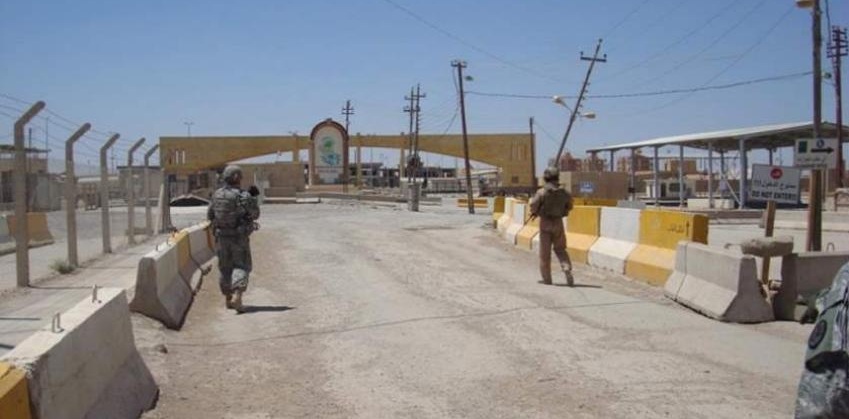Alwaght- Russian Sputnik news agency reported that at late night yesterday fighter jets, allegedly Israeli, launched airstrikes on military positions in the Syrian city of Al Bukamal near the border crossing with Iraq. The area has been a point of clashes over last year and according to the Russian news outlet the US-led coalition’s warplanes in mid-September struck the region at least four times. The air raids come while over the past few days the word spread that the Syrian and Iraqi governments agreed to reopen the border crossing between the two countries.
How is Al Bukamal crossing significant?
The strategic Al Bukamal border crossing is 450 kilometers away from Damascus and 340 kilometers away from Baghdad. It links the Iraqi city of Qa’im in Al Anbar province to the Syrian city of Deir ez-Zor. The two cities are closest to the shared border. The border crossing was so important that ISIS terrorist group, a Western-Arab proxy force, since its emergence in Syria and Iraq captured the two cities of Qa’im and Deir ez-Zor, bringing under its control the border route.
With over 600 kilometer shared borders, Iraq and Syria are linked through three key border gates. First one is Rabia, also called Yaarubiya, border crossing that connects Syria’s Hasakah to Iraq’s Al-Rabia. It was closed in 2013 and is currently occupied by the American and British forces along with the Kurdish Syrian Democratic Forces (SDF).
The second one is Al-Walid, located in Al-Ratba region of Al-Anbar close to the extreme west of Iraq and extreme north of Jordan in a desert area. The Damascus-Baghdad highway crosses through this region.
The American and British forces are in ongoing efforts to fuel tensions between the Sunni Arabs of the region and other Syrian and Iraqi groups all to take control of the border route. The two countries arranged forces defected from the Syrian army under Syrian Commando Army to launch attacks at the border crossing vicinity.
The third one is Qa’im, also called Al Bukamal, which is vital to Iraq and Syria militarily, politically, geopolitically, economically, and even culturally. ISIS rise was possible by the capture of the crossing and its defeat was possible by retaking the crossing. But what doubles Al Bukamal significance is its connection of the Axis of Resistance’s ground forces and their taking the initiative from the US and Israeli-backed terrorists that still sporadically carry out terror attacks against Syrian and Iraqi forces.
The reopening will allow the situation there to return to pre-ISIS period and movement among Iraq, Iran, and Syria will back to normal. Economically, the reopening will facilitate the increase of trade between the two countries over 30 percent. Re-activating the gate practically means offering Syria a breath way and breaking the economic blockade imposed on Damascus by the US and some other Western countries.
Reopening efforts
The efforts to reopen the border crossing date back to last year when the Iraqi Foreign Minister Ibrahim al-Jaafari and his Syrian counterpart Walid Muallem met in Baghdad. Once it is opened again, part of the Syrian fuel and currency needs will be met. This is in contradiction to the American policy adopted over the years of the Syrian war for the good of the Israeli interests. The special representative to the Syrian crisis during a visit to Istanbul last year said that the US imposes economic sanctions to dry out the Syrian government and its allies’ incomes. Furthermore, some drone flights by the US and the Israeli regime to watch Iraq’s Popular Mobilization Forces (PMF) and the allied forces have been launched from Syria’s eastern Euphrates. Once Al Bukamal is reopened and the Resistance camp’s sections are reconnected via ground, the Israeli and American hands for drone flights over Iraq will be closed.
Desperate obstruction efforts
Washington and Tel Aviv through a couple of fronts seek to hamper the reopening, among them air raids. The US warplanes by their missile and airstrikes capabilities cover the two sides of the Euphrates River from Al-Tanf airbase to Haql al-Omar airfield in Deir ez-Zor suburbs. In mid-September, Syrian official news agency SANA reported a meeting between Syrian and Iraq officials in Baghdad to discuss reopening the border crossing. Simultaneously, Israeli fighters struck an unused Syrian military base in the region. The attacks apparently were aimed at preventing reopening the border crossing. The Syrian army seemed to be already prepared for the attack as it intercepted a majority of the missiles. A second American and Israeli instrument against the crossing reopening is the Syrian Commando Army that is now controlling Al-Tanf crossing. With the US help, the militia since May started recruiting Syrian youths and training them in Al-Rukban refugee camp of Jordan to initiate a new ground front in Al Bukamal and Al-Mayadin.
But what is important to take into account is the strong political will of Syria and Iraq to reopen the border crossings, something thwarting the American and Israeli efforts to delay this strategic necessity. Another factor changing all of the equations on the ground is the experience of the Resistance forces who have shown themselves to be the most experienced forces in ground clashes with the Western-Arab-Israeli-backed terrorists since 2011. It was these forces that managed to recapture Al Bukamal in 2017 from ISIS as the prelude to reopening of the border gate. They now have an upper hand in the fight against the proxy forces and spiritually they are in a better condition than the US and Israeli proxies who are nearing their expiration.



























